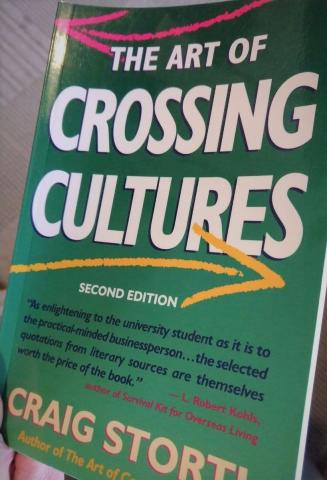"Those who like to feel they are always right and who attach a high importance to their own opinions should stay at home." –Aldous Huxley
Living in a different culture brings a myriad of challenges. It’s a whole new world. Where will you get groceries? What are the social expectations? Can you speak the language? You have no idea that much of what is normal to you is not also universal, that much of what you think of as human nature is only cultural. Figuring out what is going on in your new world can leave you drained and frustrated, but Craig Storti’s book The Art of Crossing Cultures is a good place to start in preparing to successfully navigate these challenges.
What causes an interaction with a person from another culture to end badly? You expect other people to behave like you do. When people inevitably act differently than you expect them to, a cultural misunderstanding occurs. You react with anger, worry, etc. This causes you to try to avoid the local culture. At the same time, they are also expecting you to act like they do and when you don’t they become upset and avoid you. So part of the answer is to stop expecting locals to act like you do.
You can’t very well expect to recognize when locals are behaving like locals if you have no knowledge of how the locals typically behave. You can learn about the local culture in three ways: through observing the locals in action, through asking them about specific behaviors, and through reading about or taking classes in the local culture.
To complicate matters, you can hardly learn by observation alone, because what you see does not constitute meaningful behavior in your own culture. Would you understand, watching a Hindu friend arrange his bedroll, that he was trying to position himself so as not to be pointing his feet at anyone’s head (instead of trying to get near the window or away from the door)?
Thankfully, it is possible to adjust expectations to fit the reality you now live in, but the process whereby you replace ethnocentric expectations with culturally appropriate ones tends to proceed in fits and starts. But you will eventually have a new pair of eyes with which to see the world.
The overseas experience profoundly transforms all who undergo it. You either open yourself up to the experience and are greatly enriched by it, or you turn away – and are greatly diminished.
Storti’s book is a fast read, packed with delightful quotes and many examples of typical cross cultural tension points. In today’s multicultural world, this book is a great investment for every home.
—Pauline H., an All-Nations member
Note: Although Storti is not writing to missionaries or from a Christian perspective, many people working for God's kingdom in other cultures have found his book helpful.

